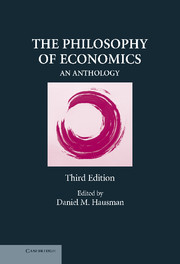Book contents
- Frontmatter
- Contents
- Introduction
- PART ONE CLASSIC DISCUSSIONS
- PART TWO POSITIVIST AND POPPERIAN VIEWS
- PART THREE IDEOLOGY AND NORMATIVE ECONOMICS
- PART FOUR BRANCHES AND SCHOOLS OF ECONOMICS AND THEIR METHODOLOGICAL PROBLEMS
- PART FIVE NEW DIRECTIONS IN ECONOMIC METHODOLOGY
- 22 The Rhetoric of This Economics
- 23 Realism
- 24 What Has Realism Got to Do with It?
- 25 Feminism and Economics
- 26 Credible Worlds: The Status of Theoretical Models in Economics
- Selected Bibliography of Books on Economic Methodology
- Index
- References
26 - Credible Worlds: The Status of Theoretical Models in Economics
Published online by Cambridge University Press: 05 June 2012
- Frontmatter
- Contents
- Introduction
- PART ONE CLASSIC DISCUSSIONS
- PART TWO POSITIVIST AND POPPERIAN VIEWS
- PART THREE IDEOLOGY AND NORMATIVE ECONOMICS
- PART FOUR BRANCHES AND SCHOOLS OF ECONOMICS AND THEIR METHODOLOGICAL PROBLEMS
- PART FIVE NEW DIRECTIONS IN ECONOMIC METHODOLOGY
- 22 The Rhetoric of This Economics
- 23 Realism
- 24 What Has Realism Got to Do with It?
- 25 Feminism and Economics
- 26 Credible Worlds: The Status of Theoretical Models in Economics
- Selected Bibliography of Books on Economic Methodology
- Index
- References
Summary
Robert Sugden (1949–) is a professor of economics at the University of East Anglia. His research uses theoretical, experimental, and philosophical methods to investigate issues in welfare economics, choice under uncertainty, pro-social behavior, the emergence of conventions and norms, economic methodology, and philosophical economics. He is probably best known for developing “regret theory” (with Graham Loomes) and for The Economics of Rights, Cooperation and Welfare, one of the first applications of evolutionary game theory to social theory and moral philosophy. Currently, he holds a research fellowship from the Economic and Social Research Council for work on reconciling behavioral and normative economics.
Overview
Using as examples Akerlof's ‘market for “lemons”’ and Schelling's ‘checkerboard’ model of racial segregation, this paper asks how economists' abstract theoretical models can explain features of the real world. It argues that such models are not abstractions from, or simplifications of, the real world. They describe counterfactual worlds which the modeller has constructed. The gap between model world and real world can be filled only by inductive inference, and we can have more confidence in such inferences, the more credible the model is as an account of what could have been true.
Introduction
I write this paper not as a methodologist or as a philosopher of social science – neither of which I can make any claim to be – but as a theoretical economist. I have spent a considerable part of my life building economic models, and examining the models that other economists have built.
- Type
- Chapter
- Information
- The Philosophy of EconomicsAn Anthology, pp. 476 - 510Publisher: Cambridge University PressPrint publication year: 2007
References
- 2
- Cited by



